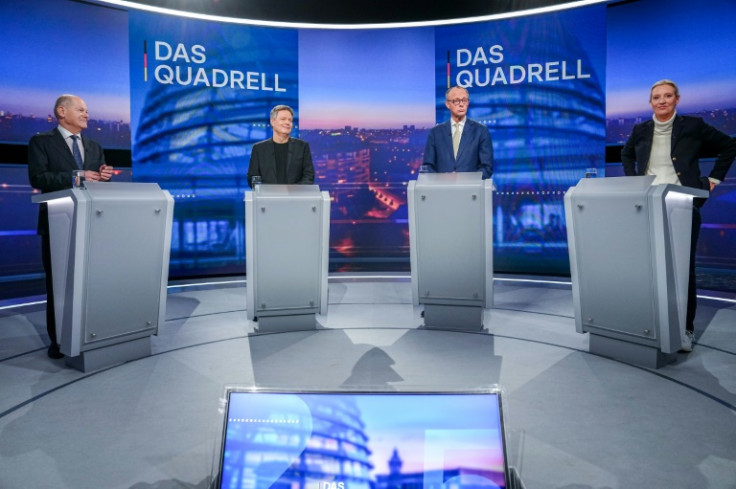US Tensions Plague Final Phase Of German Election Campaign

Germany enters the final week of election campaigning Monday, with the debate more heated than ever amid controversy over alleged US interference in favour of the far right.
After weeks of sparring on migration and a surge of support for the far-right Alternative for Germany (AfD), the race took a new turn last week with comments by US Vice President JD Vance.
Speaking in Munich on Friday, Vance called on Germany to drop its decades-long taboo of having the far right in government, insisting there was "no room for firewalls".
His comments brought tens of thousands of demonstrators to the streets of Berlin on Sunday and became one of the main talking points in the latest TV debate between top candidates.
"I will not allow an American vice president to tell me who I can talk to here in Germany," said Friedrich Merz, whose party is currently leading the polls on around 30 percent.
The conservative CDU candidate told voters he would "not tolerate such interference" in the February 23 polls or coalition negotiations.
Chancellor Olaf Scholz also rejected Vance's comments as "unacceptable" and asserted there is "no cooperation with the extreme right".
But the leader of the ascending AfD -- which also has the support of top Washington adviser Elon Musk -- on Sunday praised Vance for having "spoken out so clearly".
"We must not build firewalls to exclude millions of voters from the outset -- we have to talk to each other. He made that clear," Alice Weidel told the TV audience.
With more TV showdowns and public rallies due, candidates are vying for every vote in the bitter campaign.
Around 30 percent of Germans are undecided who they want to vote for, according to the latest surveys.
Viewers of Sunday's debate put Merz ahead with 32 percent, while Scholz came second with 25 percent, according to a poll by the RTL broadcaster.
Weidel -- the first AfD politician to feature in such a debate -- found favour with 18 percent of viewers. She tied with Robert Habeck of the Greens.
"None of the candidates landed a knockout blow," the head of polling firm INSA, Herrmann Binkert, told Bild daily.
The debate was unlikely to produce any "big changes", Binkert said, as Merz's polling lead looks set to hold firm.
The vote is being held six months earlier than planned after Scholz's centre-left coalition collapsed unable to agree on how to balance the budget.
The campaign since has been dominated by a bitter debate on migration after a series of attacks blamed on asylum seekers.
Most recently, a two-year-old girl and her mother were killed in a car-ramming attack in Munich last week that left 37 others wounded.
The anti-immigration AfD has seen its poll ratings edge upwards in recent months and is expected to register a record-breaking score of around 20 percent of the vote.
The final stage of the campaign gets underway as Europe confronts a growing rift with Washington over the Ukraine war, with Germany expected to have a seat at the table in Paris security talks on Monday.
US President Donald Trump has sidelined European leaders by calling his Russian counterpart Vladimir Putin, ahead of bilateral talks on Ukraine expected in the coming days.
Scholz said Europe must be involved in any talks "because it cannot be done without us".
"There will be no security guarantees that we have not developed ourselves and accept for ourselves," he said.
Trump's special envoy to Ukraine, Keith Kellogg, has said Europe would not be directly involved in talks on Ukraine, though it would still have "input".
But Scholz said "no decisions will be made over its (Kyiv's) head -- we Europeans will not allow that".
© Copyright AFP 2025. All rights reserved.





















